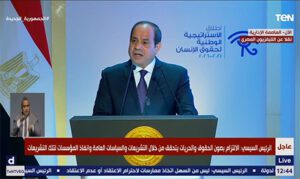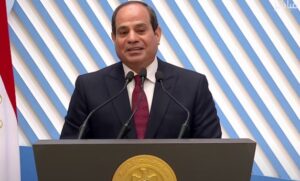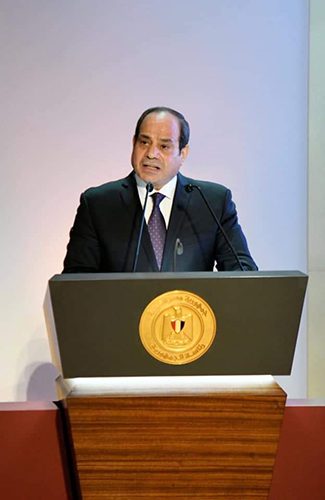Egyptian President Abdel Fattah El Sisi said Saturday that the launch of the National Human Rights Strategy is a ‘serious step’ on the road to improving human rights conditions in Egypt.
“We have to take into consideration that this vital [human rights] field is a measure of the progress of societies,” President Sisi said.
He added Egypt is committed to respecting and protecting personal freedoms, the right to political participation and free speech.
President Sisi added that Egypt welcomes differences in opinions as long as they respect the freedoms of others and aim to serve the interests of the country and the people.
He said civil society organisations contribute to spreading awareness about human rights and participate in the fight against extremism.
Addressing a large audience of government officials, civil society activists, MPs, foreign diplomats and media on the occasion of the launch of Egypt’s first National Human Rights Strategy, President Sisi added that Egypt was one of the earliest contributors to the Universal Declaration of Human Rights in 1948.
Egypt, he said, has not stopped contributing to this field since then, but continued to make contributions out of its deep belief in the importance of formulating a national strategy for the protection of human rights and basic freedoms.
“We launch today the National Human Rights Strategy, the culmination of more than a year of work by the Permanent Higher Committee for Human Rights,” President Sisi said.
He noted that the strategy was drafted with participation of and consultations among a large number of people and institutions to fulfil the aspirations of Egyptians.
Egypt, he said, would continue to exert tireless efforts to back the freedom of religion and belief.
“Egypt, the country with a rich religious heritage, continues to make unremitting efforts to emphasise the values of citizenship, tolerance and dialogue, and to combat incitement to violence and discrimination,” President Sisi said.
“Standing side by side in the New Administrative Capital, the Al-Fattah Al-Aleem Mosque and the Nativity of Christ Cathedral harmonised as witnesses to our achievements,” he added.
Serious commitment
The National Human Rights Strategy is set of aspiring goals set out by state authorities to be achieved until 2026.
It took the committee a year and a half to draft the strategy, a work that included intensive consultations and revisions.
The strategy contains several sections, including one on political rights, another on economic rights and a third on social rights.
Foreign Minister Sameh Shoukri, who is the head of the Permanent Higher Committee for Human Rights, said the strategy lends great support to the human rights infrastructure in Egypt.
“It also reflects the presence of a strong political will for translating constitutional rights and international agreements into action in the light of keenness by the Egyptian government on turning human rights into a cornerstone of Egypt’s comprehensive development and the country’s development strategy for 2030,” Minister Shoukri said.
He added that before formulating the strategy, his committee had considered the recommendations made by the National Council for Human Rights and the remarks of 30 ministries and agencies.
“We also surveyed all previous plans, programmes and activities on human rights along with the recommendations of regional and international human rights organisations,” he added.
Speaking during the launch of the strategy was a host of media figures, thinkers and MPs. Some of these speakers highlighted the importance of the implementation of the strategy and the presence of a strong will inside state institutions for this implementation.
Renowned journalist and TV host Ibrahim Essa said some of the nation’s human rights laws are excellent.
“However, these laws come short of enforcement because some executives hinder this enforcement,” Essa said.
He called on the parliament to form a bloc of human rights defenders, who can lobby for legislation that can serve the implementation of the strategy in the coming five years.

Integrated process
President Sisi said Egypt’s vision for human rights is based on the fact that all these rights are interconnected and have to be integrated.
There are close links between democracy and human rights, he said.
President Sisi underscored the importance of making a balance between the rights and the duties of citizens, on one hand, and the rights of individuals and the rights of society, on the other.
“Commitment to the protection of rights and freedoms can be achieved through legislation and general policies,” the president said. “It can also be achieved through the ability of national institutions to enforce this legislation,” he added.
Real challenges

Before delivering his address about the launch of the national strategy, President Sisi enumerated some of the challenges that hindered progress in the protection of human rights nationwide.
The president said the 2011 uprising against the late longstanding president Hosni Mubarak was like a declaration of the death of the Egyptian state.
He added that Egypt’s successive governments formulated different economic and social policies for national development.
However, he said, internal and regional conditions hindered the implementation of these policies.
In a veiled reference to the outlawed Muslim Brotherhood movement, the president said the movement kept operating secretly for decades to undermine the Egyptian state.
President Sisi mentioned some of the problems he tried to solve in the past, including the reform of religious discourse and ending verbal divorce.
He said the religious establishment rejected his proposals in this regard and that he did not want to clash with the establishment.
“It takes societies a long time to change and develop,” the president said.
He added that he did not have any problem with maintaining presence and expressing their views, provided that they do not impose these ideas on the members of society by force.
President Sisi also faulted some members of the international community in wanting to impose their ideals on some countries, even as these countries had different cultures and conditions.






Discussion about this post